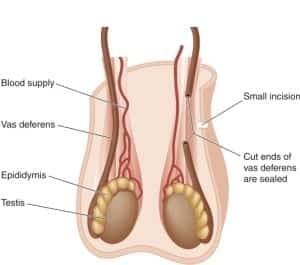Vasectomy Chattanooga, TN
Enjoy Sex Without The Worry
Vasectomy is a minimally invasive, relatively permanent form of contraception that prevents pregnancy by blocking the release of sperm when you ejaculate. Usually, this procedure is performed with ease in an office setting allowing you to return to your normal activities as soon as comfortable. Our surgeons have performed hundreds of vasectomies and their patients often do not require the use of pain medications after the procedure. They utilize a “no-scalpel” technique that requires no sutures be placed, leading to an excellent cosmetic outcome. The chance of a vasectomy failure is 1/2000, making it the most successful form of contraception for men.
A vasectomy does not affect your sex life or your hormones. Research shows that it does not increase your risk for cancer, specifically prostate or testicular cancer. Furthermore, vasectomy will not protect your partner from sexually transmitted diseases carried in your ejaculate.
Why Should I Have a Vasectomy?
- You do not want to worry about pregnancy. You can enjoy sex without the worry.
- You may not want a child or more children in the future. You and your partner agree that your family is complete.
- To prevent passing on a hereditary illness.
- Your partner’s health would be threatened by a future pregnancy.
- You or your partner do not want the challenges of another type of contraception.
- You don’t want your partner to undergo tubal ligation, the surgery to sterilize a woman.
What Can I Expect From The Vasectomy Procedure?
The procedure is usually performed in the surgeon’s office or an outpatient facility under local anesthetic. Regardless of the procedure used, the surgery clamps, cuts or seals the vas deferens from each testicle, the tubes that connect the testicles to the urethra. When you ejaculate, sperm flows from the testicles into the vas deferens. When they are blocked or sealed, sperm cannot mix with the semen when you ejaculate. Without sperm in the semen, an egg cannot be fertilized. However, the testicles continue to produce sperm, which is reabsorbed by your body.
There are two types of vasectomies:
- Incision method- an incision is made on each side of the scrotum or in the midline and the vas deferens is located. The vas deferens are the tubes that carry the sperm. A small section of these tubes are cut and removed or the tubes are blocked, or tied off. The ends are cauterized or sealed. Glue or stitches will be used to close the incision.
- No-incision/No-scalpel method – the skin on the scrotum is punctured on each side to reach both sets of tubes. A small portion of the tubes is cut and removed, cauterized and blocked with a clip. No stitches are needed. This method reduces the risk of infection, bleeding, and complications, and is as effective as a traditional vasectomy.
Our surgeons prefer the no-scalpel technique. Nevertheless, the success rates between “scalpel” versus “no-scalpel” are similar. The no-scalpel technique may offer a better cosmetic result. A No-needle vasectomy may also be offered for men who dislike the idea of needles or have a severe response to needles, leading to fainting. During this technique, a tool places the numbing medication under the skin without the sensation of a needle prick. Some say the sensation is like a small rubber band snapping on your skin.
Here’s What Our Patients Are Saying…
“I would highly recommend Dr. Shridharani to anyone. I was referred to him by another doctor in his field because of the complicated nature of my case, and was told that Dr Shridharani was the best physician to address my surgical needs. From the first time I met him, he was very thorough and very patient with me. He spent as much time as I needed to answer my questions and explain all of my options. I am very pleased with my outcome and thankful there is a specialist of his caliber here in town. It is nice in todays world of “quick” medicine to find someone who takes the time to address your concerns and needs.” -BB
Feel free to check out all the reviews here.
Click Here For Pricing
What Is Recovery Like After a Vasectomy?
Generally, you can go home the same day and recover over the course of a week. Vasectomy is nearly 100% effective by three months after the surgery. You will need to use birth control until then. Your surgeon will check your semen for sperm after surgery by conducting a sperm analysis that will be scheduled for you at the time of the vasectomy. This will determine when there is no sperm left in your ejaculate. The high success rate cannot be guaranteed unless you have a semen analysis performed. Your sex drive or erections will not be affected. You will still ejaculate but there will be no sperm in your ejaculate.
Who Is the Ideal Candidate for Vasectomy?
If you (and your partner) are positive you don’t want or are done having children, a vasectomy will eliminate the risk of any future pregnancy. It is recommended that you are in overall good health before undergoing this procedure. A vasectomy may not be right for you if you are only considering this treatment to please your partner and not yourself. Because vasectomies cannot always be reversed, it is important to be sure this treatment is one you are sure you want to have.
Will My Insurance Cover This Procedure?
This is dependent upon the type of insurance you have. Most patients are eligible for full or partial insurance for their procedure, but some are not covered at all. However, if contraception is your ultimate goal, investing in a vasectomy procedure may be ultimately cheaper than paying for decades of other methods of birth control.
Will a Vasectomy Affect My Sex Drive?
No. Vasectomies will not affect your sex drive or desire. Many patients report that their vasectomy can make their sex life more pleasurable and worry-free, since their procedure has eliminated the anxiety from potential risk of pregnancy.
Are There Risks Involved With Vasectomy?
No procedure is risk-free, and problems can occur. You will likely have bruising, discomfort and swelling that recedes within 1-2 weeks after the procedure. Your surgeon will explain all of this to you before the procedure. Feel free to ask questions.
If you experience any of these symptoms, call your doctor.
- Signs of infection include fever, redness, and tenderness
- Significant bleeding under the skin of the scrotum
- A large or expanding lump in the scrotum
- Pain in the testicles not managed well with ibuprofen or Tylenol
Can Vasectomy Procedures Fail?
While rare, it does happen and can lead to unintended pregnancy. The statistics are that 1 out of 2000 vasectomies will fail over the course of 2 years. About half of these fail within 3 months. There is also a small risk that the tubes will grow back together.
What Do I Do If I Have Regrets About My Vasectomy?
If there is any chance you may change your mind, the best option is to bank your sperm before the vasectomy. If down the line, you have regrets, not to worry. The procedure can successfully be reversed if life circumstances change. Sperm will begin to appear about 3 months after reversal, but it may take a year to achieve pregnancy after reversal. It is important to understand that the likelihood of restored fertility decreases the longer the time between the vasectomy and the reversal.
You will have no regrets when you choose the exceptional urologic surgeons at UT Urology. Choose the regional leaders and experience the comfort of knowing you are in the hands of the best, most experienced surgeons in Chattanooga, Nashville and Knoxville, Tennessee as well as Huntsville, Alabama and Northern Georgia.
Call To Schedule an Appointment
If you are in the Chattanooga, Knoxville, TN, Huntsville, AL or surrounding area, contact Dr. Shrid Men’s Health & Microsurgery today at (423) 778-4636 or by filling out the contact here to learn more about a vasectomy procedure.



